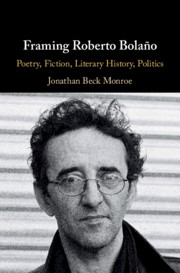Book contents
- Framing Roberto Bolaño
- Framing Roberto Bolaño
- Copyright page
- Dedication
- Contents
- Acknowledgments
- Abbreviations
- Introduction Unpacking Bolaño’s Library
- Part One
- Part Two
- Chapter 4 Poetry at the Ends of Its Lines
- Chapter 5 Post-Avant Histories
- Part Three
- Part Four
- Conclusion From the Known to the Unknown University
- Notes
- Index
Chapter 4 - Poetry at the Ends of Its Lines
The Unknown University (La Universidad Desconocida) Nazi Literature in the Americas (La literatura nazi en América)
from Part Two
Published online by Cambridge University Press: 09 September 2019
- Framing Roberto Bolaño
- Framing Roberto Bolaño
- Copyright page
- Dedication
- Contents
- Acknowledgments
- Abbreviations
- Introduction Unpacking Bolaño’s Library
- Part One
- Part Two
- Chapter 4 Poetry at the Ends of Its Lines
- Chapter 5 Post-Avant Histories
- Part Three
- Part Four
- Conclusion From the Known to the Unknown University
- Notes
- Index
Summary
The manuscript of collected verse and prose poems Bolaño began assembling in 1993 under the title “Fragmentos de la Universidad Desconocida,” published posthumously in 2007 as The Unknown University, marks a pivotal moment in his career. Bringing to a close his lifelong aspiration to gain recognition primarily as a poet, its three-part construction, with Antwerp at its center (recycled and retitled as People Going Away), signals a decisive transition and reorientation of Bolaño’s writing priorities over the course of his final decade. Positioning as “one of the wings / of the Unknown University!”–but only one–the verse poetry he had loved all his life but come to find as limiting as Poe, Baudelaire, and Rimbaud had found it to be a century-and-a-half earlier, The Unknown University sets the stage for one of the most productive decades any writer has known. Following quite logically on the farewell to poetry as verse that is The Unknown University, Bolaño published only three years later, in 1996, the breakthrough year of his career, the condensed, prose-poetic fiction of Nazi Literature of the Americas and the novel of poetic apprenticeship this is in fundamental respects both its companion text and its sequel, Distant Star.
Keywords
- Type
- Chapter
- Information
- Framing Roberto BolañoPoetry, Fiction, Literary History, Politics, pp. 65 - 85Publisher: Cambridge University PressPrint publication year: 2019



